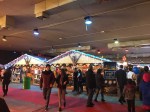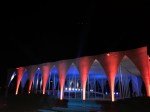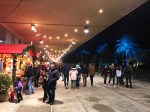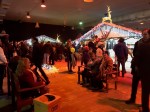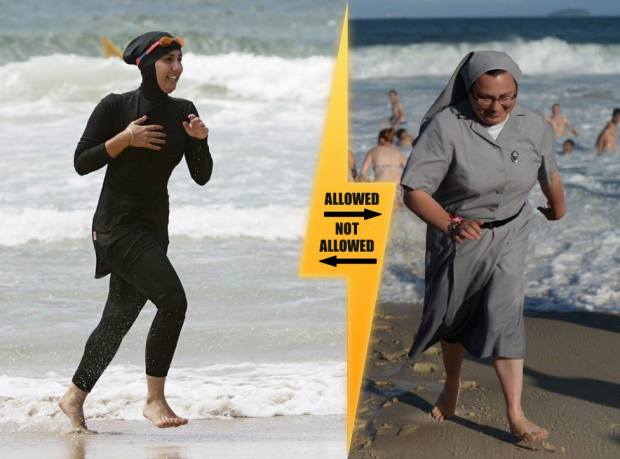Tripoli’s Ahwak Cafe is a lot of things. Nestled right across a Mosque in the Dam w Farz area, in the newer parts of the city, a stone’s throw away from the gorgeous Rachid Karami forum, it’s a place that’s become synonymous with the city’s most liberal youth frequenting it. In that coffee house’s bathroom is collection of graffiti, one of which reads: “Your ignorance of scientific knowledge is not proof that God exists.”
That’s probably the only place in Tripoli where you’d find such a statement, but it exists.
Ahwak Ben Tafesh did not have as easy an existence in Tripoli as you’d normally think a coffee place would be. I made it a habit to support it every time I went to the city, precisely because it represented the kind of Tripoli that I can relate to, that makes you hopeful of a better future for the city.
It was threatened by Islamists more than once. It was in fact attacked by Islamists back in July of 2013 when one of their newly-released extremists rode up with his goons in an SUV, stormed the place, trashed it, threatened people with weapons, and left.
Lebanon’s government did nothing about the incidence.
Fast forward nearly 4 years later. It’s May 31st, 2017, almost a week into the Muslim month of Ramadan and that mosque across the street – known as the Abdul Rahman Mosque – loses the electricity to its outdoor space and speakers.
In one moment, all hell broke loose. And what turned out to be a damaged electrical wire was turned into an attack on Tripoli being the citadel of Muslims in Lebanon, an attempt to silence the sound of Mosques.
So naturally, the day after, on June 1st, this statement was made, not by the Mosque but by Islamists who have not yet been identified:
Its overall essence translates to:
“Ahwak Ben Tafesh coffee shop in the Dam w Farz area has had a problem with the nearby mosque for a long time, and is known to have atheist clientele. They’re the prime suspect in what happened at the Rahman Mosque. To its owner and clients we say: close the premises and stay home or move somewhere outside of Tripoli the city of Muslims, within 48 hours as a maximum. You’ve been worked.
Signed the Propagation of Virtue and the Prevention of Vice.”
Said “Propagation of Virtue and the Prevention of Vice” or الأمر بالمعروف والنهي عن المنكر is considered to be a Muslim duty and has been distorted by Islamic extremists, notably in Saudi Arabia, to issue fatwas and decrees.
The mosque in question has denied to have issued the statement through a Facebook post. The area affected by the electrical cut was the outer courtyard as well as nearby locations which offered their rooftops for extra speakers to broadcast the tarawih.
By threatening Ahwak Ben Tafesh that way without any ounce of proof, with a government that has yet to act in any way to protect the coffee shop, its owner and its clients, these extremists are giving a carte blanche to the brainwashed masses that listen to them to go and destroy the coffee house in the name of religion. This is uncharted territory in Lebanon, and simply terrorism.
Some of the mosque goers were not particularly happy:
That particular mosque has a history of banning speakers they don’t agree with from being given the chance to hold conferences in Tripoli, to accusing everyone who doesn’t follow everything they say of heresy. Anyone could have cut that wire or damaged it. Ramadan is one of that mosque’s busiest times with the tarawih. One of the worshippers could have inadvertently damaged it.
And yet here we are.
Why Tafesh?
Because of its resistance to bans on breakfasts during Ramadan when the city’s administration was over-run by spineless politicians who succumbed to every threat by Islamists that thrived in the forgotten capital of the North,
Because of it serving alcohol and all kinds of haram things on the down low,
Because of the unabashed atheism of some its customers, their resistance to the hateful messages of those Islamists, their disdain of their city being turned into a safe place for every bearded man with poison to spew,
Because the place is a beacon of Tripoli’s liberal youth, who don’t conform to the status quo that’s forcibly enforced on their city by those who want it to be seen as the “castle of Muslims in Lebanon” and nothing more.
And this is disgraceful.
It is on the hands of the Lebanese government to find whoever cut that wire, if it’s a deliberate act, and to make sure that those who frequent the Ahwak Ben Tafesh coffee shop are safe and that the shop is protected from vandalism as well as terrorist attacks from extremists who refuse to have anyone who disagrees with them live in the same city.
Tripoli is not a city where such people should be allowed to thrive unchecked anymore. And it sure as hell is not a city where some creature can decide to ban establishments outside of its city limits with a 48 hour window and be met with complacency or even agreement. They may be a fringe minority but their political protection is becoming cancerous and detrimental to all attempts at improving Tripoli’s reputation and future.
The mosque’s speakers going out is unfortunate. If those extremists actually truly cared about the message of those tarawih and the true spirit of Ramadan, they’d have continued praying and forgave however and whatever caused that wire to break, not threaten and terrorize. I may not be Muslim or knowledgeable of Islam, but I daresay that means their fasting is not valid anymore.








